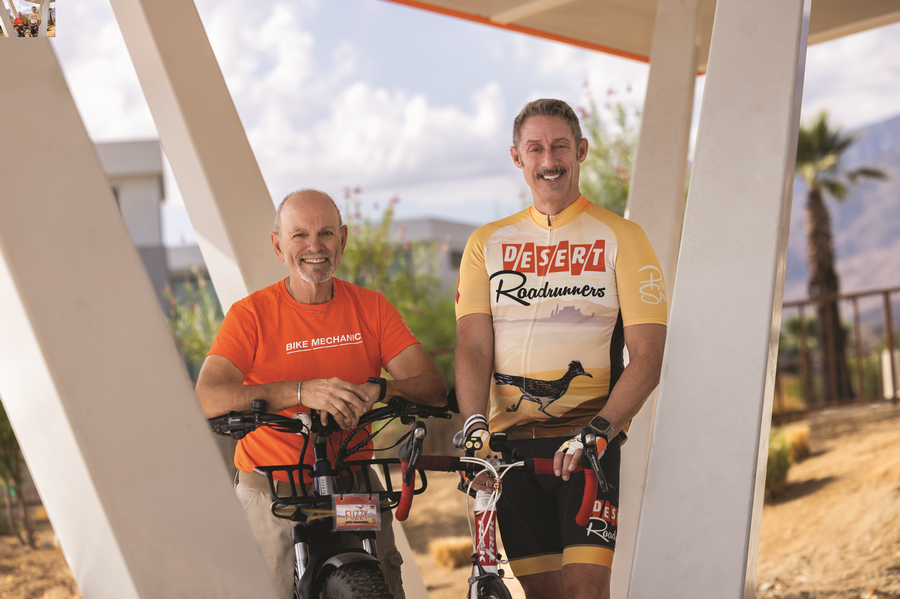Hit the Road

Victor Yepello didn’t really think about exercising until his 50s. At that time, he set up a home gym. A couple years later, he moved to the desert and learned of the AIDS/LifeCycle bike ride from his trainer at a local gym, went home, watched videos about the ride and two hours later signed up. It was a lofty goal for a man in his early 60s who had never before attempted 545 miles of biking from San Francisco to Los Angeles across the span of seven days, but Yepello was determined.
“You train for four to six months. You have to be committed to it,” says Yepello. “It’s pretty hard work and grueling doing that seven-day ride, but it’s also a hell of a lot of fun.”
Yepello has since completed three rides (2009, 2010 and 2013) and also participated as a roadie performing bicycle maintenance.
Brett Klein, Clinics Marketing Specialist at Eisenhower Health, found his way to the AIDS/LifeCycle in 1999 after an HIV-positive diagnosis in 1993. A staunch advocate in the local LGBTQ+ community - especially for HIV, AIDS and men’s health - Klein first volunteered as a roadie. In 2000, Klein rode it himself. In 2022, he road it again, overcoming a debilitating bike accident that left him with a broken clavicle, eight broken ribs and months of rehabilitation, to participate.
Klein has registered as a rider for the final AIDS/LifeCycle in 2025. The fundraising race will end after 31 years due to financial constraints and lower ridership. He’s training for eight months at about 50 to 150 miles weekly, and has set a goal of raising $30,000.
Both Palm Springs residents, Yepello’s and Klein’s paths crossed while working on city projects, and they eventually formed a friendship rooted in the AIDS/LifeCycle and joined others to create a local cycling club, the Desert Roadrunners. The near-500-member group was specifically created for the ride, whether as a roadie, cyclist or family/friend supporter.
Klein keeps active with the Roadrunners, but also enjoys spinning and workouts with a functional trainer. His first passion - cycling - always has a place in his heart, combining his love of service for his community with personal health and physical fitness.
“That’s what I’ve always loved doing. I grew up doing that,” said Klein. “I took many years off thinking I’ve got to accomplish all these other things. But cycling was both an individual and team approach. And it’s very much about support. You can be the fastest rider out there - half of what I enjoy is challenging myself - but at the same time if there is someone you’re riding with that needs help or support, then you hang back.”
Yepello recalls his enjoyment of bicycling from his first 10-speed in 1968.
“That’s when the bug bit me as far as being a road bike rider,” he said.
Cycling permeated his life even more when he retired from the real estate industry to work on his bicycle maintenance and repair business, and now he even enjoys a car-ownership-free lifestyle.
“I think cycling is good for anyone’s health,” said Yepello. “It all goes under the heading of just keep moving no matter what. No matter how you do it - walking, running, hiking, bike riding - just keep moving.”
“All the cycling I’ve done over the years has contributed to having a very healthy cardiovascular system.”
Bill Carlson, a Physical Therapist at Eisenhower Health, is a proponent of physical activity at any age regardless of health limitations. At age 64, he is a pioneer in the world of type 1 diabetes and endurance sports. In 1983, he was the first insulin-dependent person with diabetes to complete the Hawaiian IRONMAN® World Championship. In December 2023, he qualified for the World Championship after competing in the local Ironman races and will be traveling to New Zealand to compete in December 2024. Not to mention this year winning his age group in The American River 50 Mile Endurance Run, in which he has competed 20 times.
As you age, Carlson explains, the body is getting stiffer and wearing out but, “Movement gives your body function,” he says.
Even if patients are older, disabled or injured, they all need to start somewhere.
Yepello suggests purchasing an inexpensive or used bike to tune up (he does warn to never purchase a bike unridden). Then, plan what you’re going to do each week and start small.
“Before you know it, you could be riding 10, 15, 20 miles on a Saturday morning cruising around town,” Yepello says.
He also suggests reaching out on social media for a rider to join you. Or, enjoy the solitude as a time to reconnect with yourself.
“You’ve got to decide you want to make yourself healthier ... then you have to take that first step,” Yepello says. “If cycling intrigues you, then try it.”
Bicycling Tips
From Eisenhower Physical Therapist Bill Carlson
- Your body doesn’t forget how to ride a bicycle.
- Make sure the bicycle is the correct size. Touch both of your feet on the ground.
- Always wear a helmet.
Bicycling Benefits
- Burns calories
- Regulates blood pressure
- Improves heart muscle
- Takes your mind off of things that could be causing stress in your life. You may be more relaxed after putting forth physical effort.



